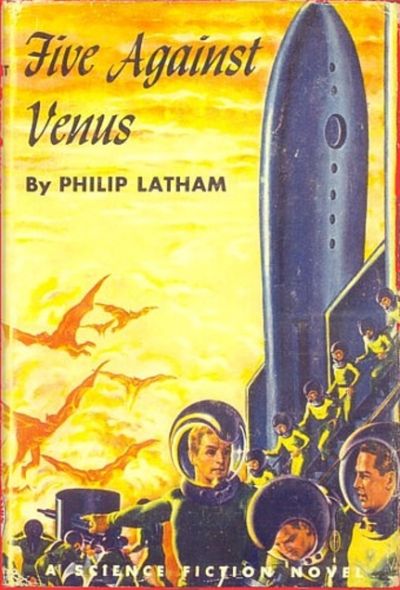Angels in the Wilderness
Five Against Venus (Winston Science Fiction, volume 3)
By Philip Latham

22 Jul, 2018
Because My Tears Are Delicious To You
0 comments
Philip Latham’s 1952 Five Against Venus was the third novel published in Winston’s SF line.
Although a member of his high school’s Space Club, sixteen-year-old Bruce Robinson has never been to space himself. His father, Mr. Robinson, is cheerful, endlessly optimistic, and consistently unsuccessful. His family lives in genteel poverty on Pico street. An expensive trip to the Moon … not gonna happen.
This changes when Mr. Robinson is hired as Tycho City’s new public relations manager. Tycho City as in Tycho Crater as in ON THE MOON. The family will become comparatively well-to-do and they will get to live on the Moon!
That’s the plan, anyway. The reality is different.
(spoilers)
Bruce has barely had time to register the fact that the captain and engineer of the transfer ship Aurora are behaving oddly when … the ship goes wildly off-course. Navigator Jim Gregor manages to get the Aurora into orbit around Venus. The least-bad option available is to set down on Venus. The dastardly captain and engineer commandeer the Aurora’s lifeboat for themselves, leaving Gregor to sacrifice himself getting the Robinsons safely to the surface of Venus.
Venus is an entirely unknown world. There has been only one expedition, five years earlier, which radioed back just after touchdown and then went silent. Why, for all anyone knows, Venus could be a world of crushing pressure and hellish temperatures!
It is fortunate for the Robinsons that they find themselves on a world which, while hot and humid, is habitable by humans.
It is expected of castaway fiction (starting with Robinson Crusoe) that by some odd chance the castaway or castaways will just happen to possess the various skills that will allow them to explore and domesticate their new world. The Robinsons defy tradition.
-
Mr. Robinson is a failed PR man;
-
Mrs. Robinson’s housewifely skills are not immediately applicable to clearing a forest;
-
Bruce’s obsessive encyclopedia reading has granted him no particular useful insights into the conditions on Venus;
-
Bruce’s heretofore unmentioned young brother Roger is nearly eaten by a plant.
The family salvages enough supplies from the wreck of the Aurora to keep them alive for the moment, but their long-term prospects seem dim.
However, this Robinsonade (in both senses) hews to tradition in that the castaways encounter natives. They learn that the natives resemble man-sized vampire bats; that they are nocturnal; and that they have been harassing the Robinsons at night. According to the renegade engineer, Simmons, who has thrown in his lot with the natives, the Man-Bats have already added the captain to the larder [1].
Night is coming. The natives are going to wake up. The future seems very grim for the space family Robinson.
~oOo~
I don’t know why people named Robinson ever go on trips.
Philip Latham was the pen name of astronomer Robert S. Richardson. Richardson was kind enough to add an extra chapter to his novel, in which he explains what was known about Venus in 1952. It’s clear from Richardson’s notes that even in 1952, the scientific evidence did not favour a habitable Venus. However, if Venus were deadly, there would be no plot. Richardson did his best to come up with a Venus compatible with known science while still being marginally habitable for humans [2].
How it is that Venusian life looks so much like Terrestrial life is never explained. This may be due to the fact that Richardson was an astronomer and not a biologist.
This is one of the Winstons that left a strong (if vague) impression on me. I remembered the Man Bats and how they’d weaponized sonar. I had forgotten the dubious relationship between King Titan, leader of the bat-folk, and Simmons, also the sad turn the relationship takes towards the end of the novel.
Simmons is pretty sure that most of the bat-folk are brutish animals. Only King Titan has an interior life … or at least that’s what Simmons tells the Robinsons (and us, the readers). But the natives of Venus have domesticated animals and build houses. They have a functioning society, which argues some ability to communicate and cooperate. I suspect that Simmons was not a reliable narrator.
Yes, this novel is 1950s pulp; it would not win any literary contests. However, it does have its points of interest.
For example, one doesn’t often see SFnal families as down-at-heels as the Robinsons. The paterfamilias has tried his hand at many things and failed at all of them. Even at making it safely to a new job on the Moon (though the failure cannot really be his fault).
No manly men with their crewcuts and slide rules in this novel, nosirree
Nor does this novel have an unambiguously happy ending. While a third expedition from Earth does show up, it’s pretty clear that saving the Robinsons is only a minor side-benefit to the main project: recovering an item lost with the Aurora. By the time the family is finally retrieved from Venus, Paul’s glorious new job has been given to someone else; the family cannot even pay its electric bill.
Thanks to Bruce, there’s a last-minute windfall. Happy ending? No reason to think that the hapless Robinsons won’t squander or be cheated out of their wealth (says the reviewer, curmudgeonly).
Five Against Venus is available here (Amazon). It does not seem to be available from Chapters-Indigo.
1: Not that the captain is dead. The bloodsuckers have a keen eye for keeping their food alive as long as possible.
2: But the author does commit a deliberate scientific blunder by giving Venus a heretofore unknown moon. Why? He tells us that it would be a shame to visit a new planet and not discover a moon.
